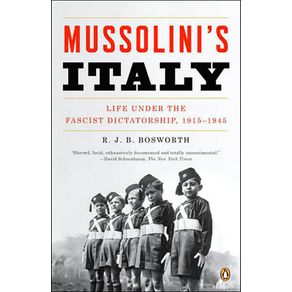Starred Review. With this insightful, comprehensive study, Bosworth secures his place as one of the two leading historians in the English-speaking world (the other being Paul Ginsborg) of 20th-century Italy. Bosworth begins with an admission that hehas embarked on an "impossible project": "to unveil the lives of Italians" from all walks of life "under a generation of dictatorship." Impossible, indeed, but what a grand attempt at a synthesis of social and political history he produces. While Mussolini and the party officials are at the center of the story, Bosworth dips into the Fascist police files to see what ordinary Italians were up to during the dictatorship, in order to portray a "fascism of the everyday." A good-natured drunken nighton the town, ending with the singing of antifascist songs in the streets disturbing the people's sleep could land you in some God-forsaken remote village as punishment; further, the dictatorship was a corrupt and compromising affair. Yet Fascism inItaly, Bosworth frequently shows, was tempered by the continuing influence of the family and other nonparty institutions such as the Church, the army, the diplomatic corps and the universities.Another important feature is Bosworth's refusal to let "Liberal Italy" (1860–1922) off the hook. From imperialism to racism, corruption to authoritarianism, liberal Italy, he says, laid the groundwork for the Fascist regime. And while he gives ample instances of the violent and at times murderous nature of the regime, Bosworth does exonerate the Italian people of falling for totalitarianism. If Italians come off well from 1922 to 1945, they look far less noble in the postwar period. Bosworth's last chapter, "The Fascist Heritage," is a disturbing account of the tenacious survival of fascism into contemporary Italy. While not as pessimistic as Ginsborg, Bosworth (Mussolini) still reminds us of the "eternal tendency toward fascism."



